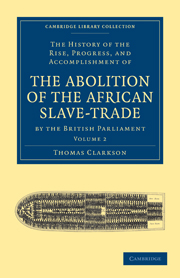Summary
It was a matter of deep affliction to us to think, that the crimes and sufferings inseparable from the Slave-trade were to be continued to another year. And yet it was our duty, in the present moment, to acquiesce in the postponement of the question. This postponement was not now for the purpose of delay, but of securing victory. The evidence, on the side of the abolition, was, at the end of the last session, but half finished. It was impossible, for the sake of Africa, that we could have then closed it. No other opportunity might offer in parliament for establishing an indelible record in her favour, if we were to neglect the present. It was our duty therefore even to wait to complete it, and to procure such a body of evidence, as should not only bear us out in the approaching contest, but such as, if we were to fail, would bear out our successors also. It was possible indeed, if the inhabitants of our islands were to improve in civilization, that the poor slaves might experience gradually an improved treatment with it; and so far testimony now might not be testimony for ever: but it was utterly impossible, while the Slave-trade lasted, and the human passions continued to be the same, that there should be any change for the better in Africa; or that any modes, less barbarous, should come into use for procuring slaves.
- Type
- Chapter
- Information
- The History of the Rise, Progress, and Accomplishment of the Abolition of the African Slave-Trade by the British Parliament , pp. 194 - 345Publisher: Cambridge University PressPrint publication year: 2010First published in: 1808

